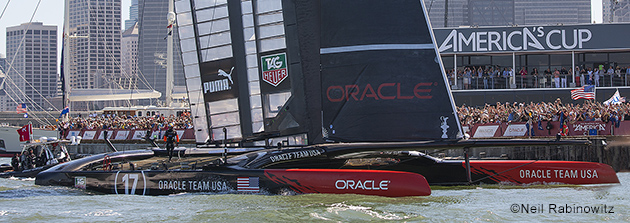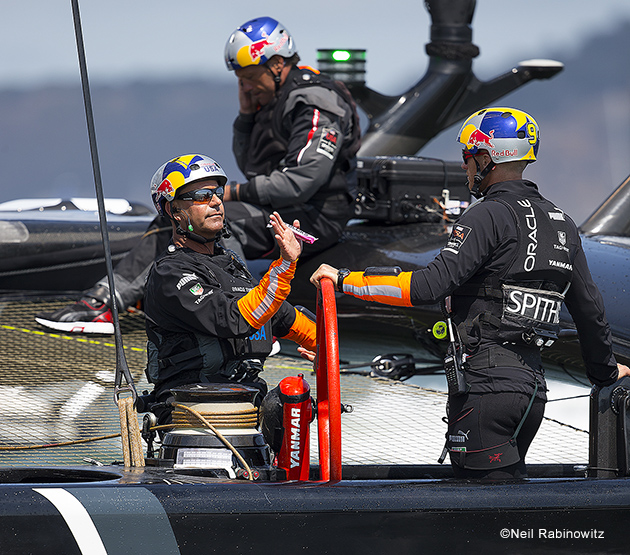BY CAROL CRONIN
America’s Cup 2013: Why Covering Won’t Work
It’s bigger, better, and faster than any other racing, but being slow still hurts just as much.
I’ve been watching the America’s Cup races live, and each start brings on a mixture of emotions. Amazement at how quickly I’ve gotten used to the speeds (I actually said out loud during race 6, “Only 21 knots?”). Awe at the graphics that make it so easy to appreciate the chess game. A little bit of eye-rolling at some of the filler commentary, which is totally unfair because commentators Kenny, Gary, and Todd are providing great information even once the racing goes Groundhog Day.
Design decisions made long ago by Team Oracle USA are making it hard for the sailors.
But my strongest emotion is total and utter sympathy for the guys on Oracle Team USA.
This Cup may not look like any other, but the “heads you win, tails I lose” situation for the Oracle sailors is quite familiar. With only one small boathandling mistake they could lose the regatta, but the winning was done long before they entered the starting box. The America’s Cup is a design game, a money game, a how-to-best-use-the-time-left game. And in that, the Kiwis have clearly already won.
I’ve sailed regattas that no one watched and been slower than the competition, and it’s gut-wrenchingly mortifying. I can only imagine how awful it is for eleven guys who know we’re all watching their every move. Yes, they can put their heads down and do their job, but they still have to live through losing sailboat races when they’re used to being winners. And then the Monday morning quarterbacks step in for the slaughter. People still ask me why Dennis Conner didn’t cover, on that September afternoon thirty years ago…
Tactician John Kostecki, left, was replaced by Ben Ainslie after race 5.
Here’s the reason: when you’re slow, textbook percentage moves like staying between your opponent and the next mark don’t work. Because the textbooks make one basic assumption: equal boatspeed. So the tactician on the slower boat tries something else, which usually doesn’t work either, and the second guessing begins. Speed kills, whether racing at 4 knots or 40.
Only one thing is going to happen too slowly in this Cup: the very public humiliation of some great sailors, who will all be trying to spit out the bitter taste of slow for a long time to come.
So for the next few afternoons you’ll find me glued to a screen, working through a thicker cocktail of feelings than I ever thought this crazy money-fest would inspire: Amazement. Awe. Eye-rolling. And most of all, sympathy for a bunch of guys who are doing a fantastic job, not covering.


